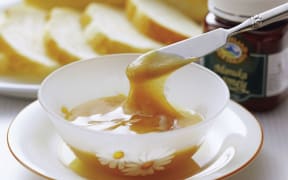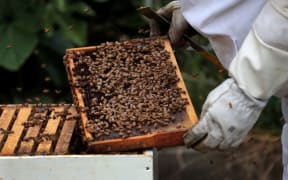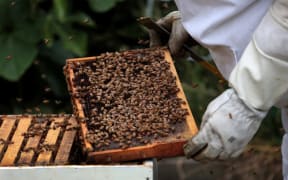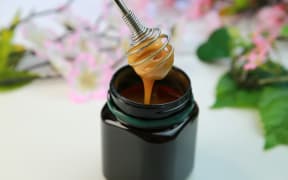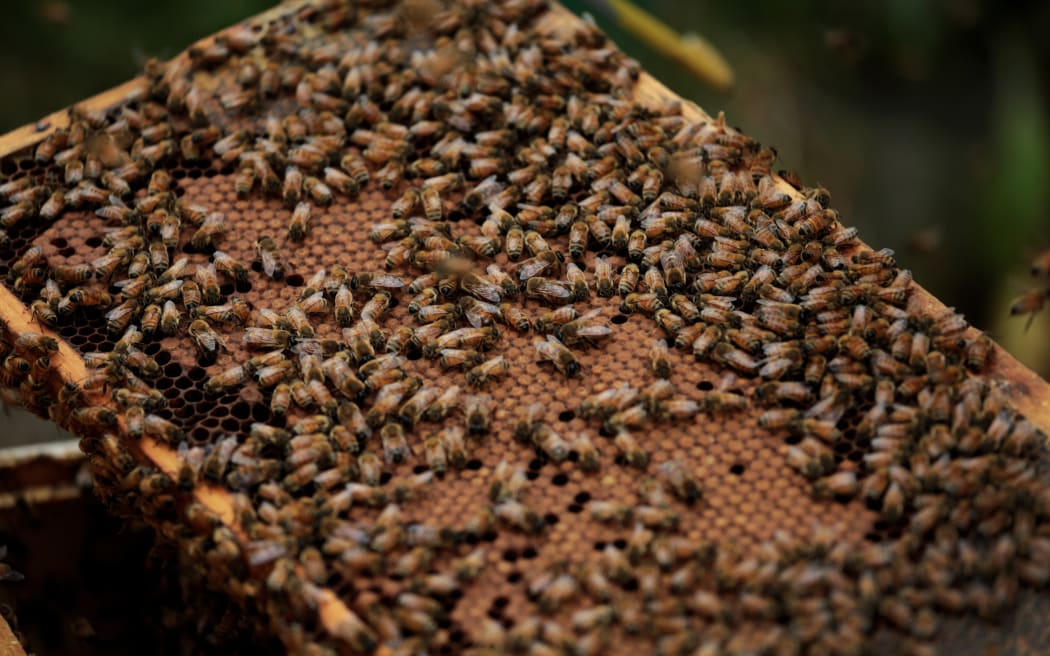
After a surge interest in mānuka honey pushed hive levels to almost 1 million, that was dropped to about 720,000 hives this year, says Apiculture New Zealand chief executive Karen Kos. (file photo) Photo: RNZ / Diego Opatowski
Falling international demand has forced some beekeepers to stockpile mānuka honey as increasing costs and pressure see more people leave the industry.
This has been common with other types of honey, which have been fetching much lower prices in recent years, but now mānuka is facing the same troubles.
Apiculture New Zealand chief executive Karen Kos estimated there was an oversupply of between 15,000 to 30,000 tonnes of honey in storage right now.
"There was a bumper crop in 2020 and the national honey harvest at that time was 27,000 tonnes," Kos said.
"That's well above our 10-year average of about 19,000 tonnes, and so that alone contributed to a surplus of 12,000 tonnes.
"That's a lot, given that we sell around 10,000 tonnes a year."
As with all major exports, Covid-19 disruptions had lasting effects on the industry, Kos said.
"We saw strong growth in honey exports, particularly in mānuka honey, for the first two years of the pandemic.
"But what really was happening, there was a lot of stockpiling going on in those export markets and that, I guess, was because of the uncertainty around the supply chain."
The industry returned to normal stock levels and practices as Covid-induced pressures on the supply chain eased, Kos said.
But the demand for New Zealand honey had dropped about 11 percent over the past year, she said.
Export prices were slipping too, with the multifloral mānuka export price falling 20 percent in the past two years, she said.
"That's been falling consistently for about the last eight quarters.
"Part of that trend is that two of our largest markets, that's China and the UK, are taking less and they're paying less for it.
"However, it's good to see that monofloral mānuka honey prices are holding well in export markets."
Rising input costs, lower profits, and increasing stress levels were resulting in more beekeepers leaving the industry, Kos said.
After a surge interest in mānuka honey pushed hive levels to almost 1 million, that dropped to about 720,000 hives this year, she said.
She expected hive numbers would continue to drop over the next two years.
"We've seen beekeepers cut costs to the bone as prices have fallen, but they just can't keep cutting costs anymore.
"We're in an environment with inflation, there's increased costs around diesel, compliance.
"It's really tough on beekeepers at the moment, and not surprisingly, we're seeing people leave the industry."
New Zealand's honey industry is working to trademark the term mānuka honey in major export countries, including the United States, China, the United Kingdom, Australia, and parts of the European Union.
If successful, it would mean only producers here would be able to use the term mānuka in its exports.
Kos said that would make a huge difference to beekeeper's sense of security.
"About 97 percent of mānuka sales come from only 15 international markets, so there is room to grow," she said.
"I think there is also some serious and ongoing investment in mānuka honey and a critical element of that is the efforts to trademark mānuka honey, which will provide a lot of certainty and confidence for ongoing investment in mānuka, and it's also a really good platform to take our story internationally."
